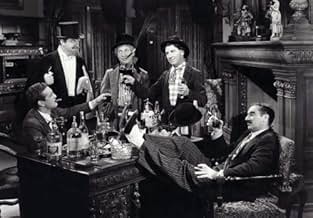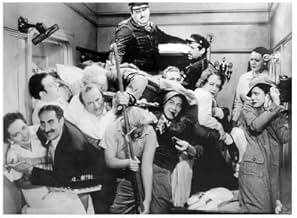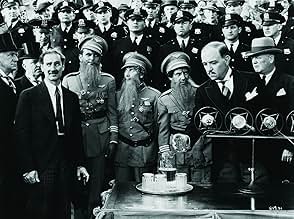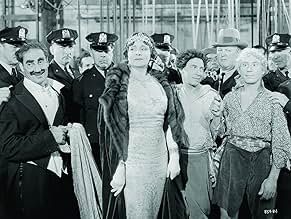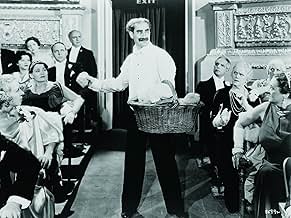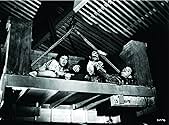CALIFICACIÓN DE IMDb
7.8/10
36 k
TU CALIFICACIÓN
Un astuto gerente de negocios y los amigos de dos cantantes de ópera les ayudan a alcanzar el éxito mientras humillan a sus enemigos.Un astuto gerente de negocios y los amigos de dos cantantes de ópera les ayudan a alcanzar el éxito mientras humillan a sus enemigos.Un astuto gerente de negocios y los amigos de dos cantantes de ópera les ayudan a alcanzar el éxito mientras humillan a sus enemigos.
- Dirección
- Guionistas
- Elenco
- Premios
- 3 premios ganados en total
Walter Woolf King
- Rudolfo Lassparri
- (as Walter King)
Sig Ruman
- Herman Gottlieb
- (as Siegfried Rumann)
Robert Emmett O'Connor
- Police Sergeant Henderson
- (as Robert Emmet O'Connor)
Enrique Acosta
- Nightclub Guest
- (sin créditos)
Harry Adams
- Opera Spectator
- (sin créditos)
Harry Allen
- Doorman
- (sin créditos)
Sam Appel
- Dungeon Guard
- (sin créditos)
King Baggot
- Dignitary
- (sin créditos)
Marion Bell
- Lady looking for 'Aunt Minnie'
- (sin créditos)
Edna Bennett
- Maid
- (sin créditos)
Dolly Blackburn
- Little Girl watching Harpo playing
- (sin créditos)
Resumen
Reviewers say 'A Night at the Opera' is celebrated for its iconic comedic routines and the Marx Brothers' unique blend of verbal and physical comedy. Groucho's wit, Chico's musical talents, and Harpo's slapstick humor are highlighted. Margaret Dumont's role and musical numbers add entertainment value, though some criticize their integration. The film is praised for its production quality and subversion of high society norms. However, a perceived shift towards more structured comedy marks the beginning of a decline in their later works.
Opiniones destacadas
I must admit that I am very light in personal knowledge of MArx Brothers films,and aside from the general information,imagery and quotes(the majority of which came from the irrepressible Groucho)that have been used and attributed in Western culture over the last seventy or eighty odd years,I have a very scant referential knowledge of their legendary body of film work.
With that in mind,when I saw the public library had a copy of this film in its stacks,it was a no-brainer for me. And it was a largely pleasing film experience as well.
The storyline seems to be somewhat insignificant: Brothers MArx are scattered about the goings on at a Venetian Opera company as it moves from Europe to New York City. They conspire to break a humble but talented tenor into the main role of the traveling show,as he is mooning over the young ingénue(Kitty Carlisle Hart,WELL before becoming the grand dame of TV Panel game shows!). But aside from the fair amount of music(hey,this IS,after all set in an Opera,so it goes to reason),this is mostly a physical comedy,laced with plenty of Groucho's standard one-liners. From watching his dealings with various straight people,from old stand-by MArgaret Dumont as his society-climbing wife,to the various lugs who signify authority(Theater directors,producers,society bigwigs,ship crew,policemen,local magistrates,etc.),Groucho is not only able to keep the humor legendarily fast and loose but also keeps the tempo of the dialog from bogging(I even noticed a sort of inspiration the creators at WArner Brothers got for Bugs Bunny from Groucho's witticisms!).
Maybe not the best of the Marxes films--though I still don't have a real gauge of opinion on this yet--but it's a fantastic starter film to build familiarity.
With that in mind,when I saw the public library had a copy of this film in its stacks,it was a no-brainer for me. And it was a largely pleasing film experience as well.
The storyline seems to be somewhat insignificant: Brothers MArx are scattered about the goings on at a Venetian Opera company as it moves from Europe to New York City. They conspire to break a humble but talented tenor into the main role of the traveling show,as he is mooning over the young ingénue(Kitty Carlisle Hart,WELL before becoming the grand dame of TV Panel game shows!). But aside from the fair amount of music(hey,this IS,after all set in an Opera,so it goes to reason),this is mostly a physical comedy,laced with plenty of Groucho's standard one-liners. From watching his dealings with various straight people,from old stand-by MArgaret Dumont as his society-climbing wife,to the various lugs who signify authority(Theater directors,producers,society bigwigs,ship crew,policemen,local magistrates,etc.),Groucho is not only able to keep the humor legendarily fast and loose but also keeps the tempo of the dialog from bogging(I even noticed a sort of inspiration the creators at WArner Brothers got for Bugs Bunny from Groucho's witticisms!).
Maybe not the best of the Marxes films--though I still don't have a real gauge of opinion on this yet--but it's a fantastic starter film to build familiarity.
No doubt that "A Night at the Opera" is right up there with "Duck Soup" as the best Marx Brothers movie. Some Marx-purists complain "ANatO" is when the brothers started to grow soft and their quality started to decline. For one thing, instead of ridiculing romantic couples (the love story subplot plays a big part), they support them. Also, it's not as surreal or satirical as their past films. To those purists, I say: Lighten up! "ANatO" is just as funny as anything the Marx Bros did in the past (heck, I think it's funnier than "Monkey Business"), and it's withstood the test of time perfectly. In fact, "ANatO" is said to be Groucho's favorite; he even called his previous films "duds"! The film is filled with jabs at the upper class and double entendres courtesy of Groucho. Sample:
Mrs. Claypool: Do you have everything, Otis?
Otis: I haven't had any complaints yet!
The love story subplot isn't as nauseating as 1937's "A Day at the Races". Allan Jones may be a bit too mushy, but Kitty Carlisle, the love interest, is cool and calm enough to help it go down easily (that's really her singing, by the way). Chico and Harpo have some inspired moments, such as their gleeful butchering of "Il Travotore" (sp?). The hapless villains are the funniest Marx foils ever, and the finale is just uproarious. "ANatO" is a wonderfully silly romp, and it's rather harmless, so kids can probably watch and enjoy it. The famous stateroom scene is nothing short of brilliant, and you'll find yourself humming along to "Cosi Cosa" (I just wish the ballad "Alone" had been left, well, alone). Don't miss this hilarious masterpiece. And now, on with the opera!!
Mrs. Claypool: Do you have everything, Otis?
Otis: I haven't had any complaints yet!
The love story subplot isn't as nauseating as 1937's "A Day at the Races". Allan Jones may be a bit too mushy, but Kitty Carlisle, the love interest, is cool and calm enough to help it go down easily (that's really her singing, by the way). Chico and Harpo have some inspired moments, such as their gleeful butchering of "Il Travotore" (sp?). The hapless villains are the funniest Marx foils ever, and the finale is just uproarious. "ANatO" is a wonderfully silly romp, and it's rather harmless, so kids can probably watch and enjoy it. The famous stateroom scene is nothing short of brilliant, and you'll find yourself humming along to "Cosi Cosa" (I just wish the ballad "Alone" had been left, well, alone). Don't miss this hilarious masterpiece. And now, on with the opera!!
This is probably the best Marx Brothers film. It is certainly my favorite. The brothers destroy pomposity and pretension by the ton. The pieces of comic business were worked out through many live theater performances before the scenes were finally filmed. This craftsmanship never shows, but it pays off completely. The stateroom scene is a classic, and the total devastation of the opera is a delicious piece of craziness.
"A Night at the Opera" is great Marx Brothers entertainment. It has comedy, music, and a good cast - everything except Zeppo, who by this time had left the act. It fully deserves its reputation as one of the two best Marx Brothers films, along with "Duck Soup".
"A Night at the Opera" is probably slightly less funny than "Duck Soup" (it is no criticism to say that of any film), but it has more of a story to connect the great comic bits. There is a good supporting cast in both films - here Sig Ruman is especially funny, in addition to the perennial Margaret Dumont. It also has several fairly long musical interludes - some are operatic, but the most entertaining is Chico and Harpo's impromptu shipboard entertainment.
Of course, the real attraction in any of these films is the comedy, and there are some memorable bits in this one. The contract negotiations between Chico and Groucho, and the scene in Groucho's stateroom, are especially hilarious, and you have to see the stateroom scene more than once to catch everything. And for sustained zany humor, the climactic sequence at the opera might be the funniest part of all.
This is certainly a must for Marx Brothers fans.
"A Night at the Opera" is probably slightly less funny than "Duck Soup" (it is no criticism to say that of any film), but it has more of a story to connect the great comic bits. There is a good supporting cast in both films - here Sig Ruman is especially funny, in addition to the perennial Margaret Dumont. It also has several fairly long musical interludes - some are operatic, but the most entertaining is Chico and Harpo's impromptu shipboard entertainment.
Of course, the real attraction in any of these films is the comedy, and there are some memorable bits in this one. The contract negotiations between Chico and Groucho, and the scene in Groucho's stateroom, are especially hilarious, and you have to see the stateroom scene more than once to catch everything. And for sustained zany humor, the climactic sequence at the opera might be the funniest part of all.
This is certainly a must for Marx Brothers fans.
Though some claim that either HORSE FEATHERS OR DUCK SOUP was the greatest Marx Brothers opus, A NIGHT AT THE OPERA has to be Marxdom's signature film. The witticisms and riotous madcap from playwright George Kaufman (THE MAN WHO CAME TO DINNER; YOU CAN'T TAKE IT WITH YOU) is evident everywhere in the some of the team's finest composition of wit and physical comedy.
After taking over MGM studios in the 1930's, big-wig Irving Thallberg pulled the Marx Bros. aside and told them, "You know, you guys are missing only one thing in your pictures: you never help anybody." After OPERA, the Marx Brothers' scripts always revolved around either an attempt to get a romantic couple together or became an effort to save an institution from going under, i.e., THE BIG STORE; A DAY AT THE RACES; HORSE FEATHERS; THE BIG CIRCUS.
Margaret Dumont is established once and for all as Groucho's perfect romantic staple and a Marx Bros. movie just doesn't seem right without her. Sig Rumond appears to have been created in a Marx Brothers comedy factory and serves sensationally as the urbane Marx antagonist vying for Dumont's favors, though upended time and time again by Groucho. A young Kitty Carlisle and Allen Jones provide the romance and music--though many audiences never realize how fine an operatic voice Carlisle had in those days.
So many hilarious and classic routines fill A NIGHT AT THE OPERA that the movie offers itself as a study in Komedy 101: the unforgettable "contract" bit between Chico and Groucho (Chico can't read). As they try to sign an agreement about the rights to manage singer Allen Jones, they tear clause after clause off the paper until Chico finally asks: "What's this?" "Oh," replies Groucho, "that's just a sanity clause." Chico bursts out laughing. "Oh, you canna' fool me; there ain't' no sanity Klaus!..." The crowded state room scene where Groucho, Chico, and Hapro stow-away in a tiny cubicle and the shoebox crams with more and more people until Mrs. Claypool (Dumont) opens the door and everyone spills out...The hotel scene where Detective Henderson tries to nail the brothers for stowing-away and everyone races back and forth between suites, furniture is switched, and Henderson is left wondering if he's nuts...
But it is the film's finale during a live performance at the New York opera house that is perhaps the comedy team's grandest movie climax. The police, still after Harpo for stowing away, try to arrest him during a live performance. He breaks through the theater's backstage, swings over the proscenium like a trapeze artist, and, at one point, tears off the dress of one of the singers. "Well, now we're finally getting somewhere!" Groucho opines from the audience.
What a shame A NIGHT AT THE OPERA is not on television more often. Young people should be treated to comedy as it once was when laughter depended upon uproarious wit and a brand of physical comedy perfected by comedians through years of refining their craft in vaudeville.
A NIGHT AT THE OPERA is nothing less than an American comedy classic.
Trivia: Maragaret Dumont appeared with Groucho on THE Hollywood PALACE television show in 1965 and the couple did a brief repartee from GROUCHO's famous Captain Spaulding routine. The next day Dumont passed away...Her last film was in 1964 in the star-studded WHAT A WAY TO GO...Always playing a haughty spinstress with money, Dumont was, in fact, a millionairess in real life and commuted between Hollywood and London....Few realize what a fine operatic singer Kitty Carlisle was in the 1930's. In the 1950's and '60's she was a regular panelist on television quiz shows such as I'VE GOT A SECRET...She was also married to playwright Moss Hart who collaborated with George Kaufman on YOU CAN'T TAKE IT WITH YOU, THE MAN WHO CAME TO DINNER, and many other plays. YOU CAN'T won the Pulitzer Prize...Allen Jones was the father of popular singer Jack Jones...Groucho said that it was while hanging out of an airplane in A NIGHT IN CASABLANCA (1946) that he finally realized the brothers had pretty much reached the end of the line in movies...The last picture in which all three brothers appeared was THE STORY OF MANKIND in 1957. Groucho played the part of Sir Isaac Newton...Groucho wrote many books: MEMOIRS OF A MANGY LOVER and LETTERS FROM GROUCHO...Harpo Marx also wrote his own autobiography: HARPO SPEAKS--a fine expose of the brothers' early years and the many stage shows they did perfecting their mayhem...When the stock market crashed in 1929, Groucho lost every dime he had: about $250,000...In the 1950's Groucho hosted his own television quiz show,YOU BET YOUR LIFE and both Harpo and Chico made surprise appearances...Chico was a lifetime gambler and would bet on anything...MINNIE'S BOYS, a stage play about the influence of Marx mother Minnie, was pretty much a flop in the 1970's...One of the all-time great quotations about the Marx Brothers came from playwright George Kaufman who, after watching the comedy team tear apart his script on stage in the early years, observed: "I could have sworn I just heard one of the original lines from the play."...Groucho was self-conscious about his lack of formal education and once had the chance to meet poet T.S. Eliot. He read many of Eliot's works and boned up on literature. When the two men did finally meet, all Eliot wanted to talk about was A NIGHT AT THE OPERA...One of Groucho's final performances just before he died was at Carnegie Hall in New York and it was a smashing success. He was accompanied by pianist Marvin Hamlisch...Film critic James Agee once said that the worst thing the Marx Brothers ever did was still better than everybody else...
Dennis Caracciolo
After taking over MGM studios in the 1930's, big-wig Irving Thallberg pulled the Marx Bros. aside and told them, "You know, you guys are missing only one thing in your pictures: you never help anybody." After OPERA, the Marx Brothers' scripts always revolved around either an attempt to get a romantic couple together or became an effort to save an institution from going under, i.e., THE BIG STORE; A DAY AT THE RACES; HORSE FEATHERS; THE BIG CIRCUS.
Margaret Dumont is established once and for all as Groucho's perfect romantic staple and a Marx Bros. movie just doesn't seem right without her. Sig Rumond appears to have been created in a Marx Brothers comedy factory and serves sensationally as the urbane Marx antagonist vying for Dumont's favors, though upended time and time again by Groucho. A young Kitty Carlisle and Allen Jones provide the romance and music--though many audiences never realize how fine an operatic voice Carlisle had in those days.
So many hilarious and classic routines fill A NIGHT AT THE OPERA that the movie offers itself as a study in Komedy 101: the unforgettable "contract" bit between Chico and Groucho (Chico can't read). As they try to sign an agreement about the rights to manage singer Allen Jones, they tear clause after clause off the paper until Chico finally asks: "What's this?" "Oh," replies Groucho, "that's just a sanity clause." Chico bursts out laughing. "Oh, you canna' fool me; there ain't' no sanity Klaus!..." The crowded state room scene where Groucho, Chico, and Hapro stow-away in a tiny cubicle and the shoebox crams with more and more people until Mrs. Claypool (Dumont) opens the door and everyone spills out...The hotel scene where Detective Henderson tries to nail the brothers for stowing-away and everyone races back and forth between suites, furniture is switched, and Henderson is left wondering if he's nuts...
But it is the film's finale during a live performance at the New York opera house that is perhaps the comedy team's grandest movie climax. The police, still after Harpo for stowing away, try to arrest him during a live performance. He breaks through the theater's backstage, swings over the proscenium like a trapeze artist, and, at one point, tears off the dress of one of the singers. "Well, now we're finally getting somewhere!" Groucho opines from the audience.
What a shame A NIGHT AT THE OPERA is not on television more often. Young people should be treated to comedy as it once was when laughter depended upon uproarious wit and a brand of physical comedy perfected by comedians through years of refining their craft in vaudeville.
A NIGHT AT THE OPERA is nothing less than an American comedy classic.
Trivia: Maragaret Dumont appeared with Groucho on THE Hollywood PALACE television show in 1965 and the couple did a brief repartee from GROUCHO's famous Captain Spaulding routine. The next day Dumont passed away...Her last film was in 1964 in the star-studded WHAT A WAY TO GO...Always playing a haughty spinstress with money, Dumont was, in fact, a millionairess in real life and commuted between Hollywood and London....Few realize what a fine operatic singer Kitty Carlisle was in the 1930's. In the 1950's and '60's she was a regular panelist on television quiz shows such as I'VE GOT A SECRET...She was also married to playwright Moss Hart who collaborated with George Kaufman on YOU CAN'T TAKE IT WITH YOU, THE MAN WHO CAME TO DINNER, and many other plays. YOU CAN'T won the Pulitzer Prize...Allen Jones was the father of popular singer Jack Jones...Groucho said that it was while hanging out of an airplane in A NIGHT IN CASABLANCA (1946) that he finally realized the brothers had pretty much reached the end of the line in movies...The last picture in which all three brothers appeared was THE STORY OF MANKIND in 1957. Groucho played the part of Sir Isaac Newton...Groucho wrote many books: MEMOIRS OF A MANGY LOVER and LETTERS FROM GROUCHO...Harpo Marx also wrote his own autobiography: HARPO SPEAKS--a fine expose of the brothers' early years and the many stage shows they did perfecting their mayhem...When the stock market crashed in 1929, Groucho lost every dime he had: about $250,000...In the 1950's Groucho hosted his own television quiz show,YOU BET YOUR LIFE and both Harpo and Chico made surprise appearances...Chico was a lifetime gambler and would bet on anything...MINNIE'S BOYS, a stage play about the influence of Marx mother Minnie, was pretty much a flop in the 1970's...One of the all-time great quotations about the Marx Brothers came from playwright George Kaufman who, after watching the comedy team tear apart his script on stage in the early years, observed: "I could have sworn I just heard one of the original lines from the play."...Groucho was self-conscious about his lack of formal education and once had the chance to meet poet T.S. Eliot. He read many of Eliot's works and boned up on literature. When the two men did finally meet, all Eliot wanted to talk about was A NIGHT AT THE OPERA...One of Groucho's final performances just before he died was at Carnegie Hall in New York and it was a smashing success. He was accompanied by pianist Marvin Hamlisch...Film critic James Agee once said that the worst thing the Marx Brothers ever did was still better than everybody else...
Dennis Caracciolo
¿Sabías que…?
- TriviaIn exasperation after several attempts to have Groucho Marx read one of his lines in the manner director Sam Wood had requested, Wood exclaimed, "I guess you just can't make an actor out of clay." Groucho Marx instantly responded, "Nor a director out of Wood."
- ErroresRicardo is clearly standing on the dock as the ship pulls away, yet he turns up on board later as a stowaway.
- Citas
Otis B. Driftwood: It's all right, that's in every contract. That's what they call a sanity clause.
[Fiorello laughs loudly]
Fiorello: You can't fool me! There ain't no Sanity Claus!
- Versiones alternativasAll references to the first portion of the film taking place in Italy were edited from the original negative sometime after the original release. There is speculation that this was done during WWII when Italy was as Axis power, but it also may have been done in the late 1930's to appease Mussolini, who didn't like the way Italians were being portrayed. Either way, the film's first scene begins rather abruptly and is missing a musical number and references to Milan, Italy.
- ConexionesEdited into Apaga y vámonos: Episode #1.5 (2013)
- Bandas sonorasIl Trovatore: Di quella pira
(1853) (uncredited)
Music by Giuseppe Verdi
Libretto by Leone Emanuele Bardare and Salvatore Cammarano
Sung by Walter Woolf King
with The MGM Symphony Orchestra
Selecciones populares
Inicia sesión para calificar y agrega a la lista de videos para obtener recomendaciones personalizadas
- How long is A Night at the Opera?Con tecnología de Alexa
Detalles
Taquilla
- Total a nivel mundial
- USD 8,953
- Tiempo de ejecución1 hora 36 minutos
- Color
- Relación de aspecto
- 1.37 : 1
Contribuir a esta página
Sugiere una edición o agrega el contenido que falta



